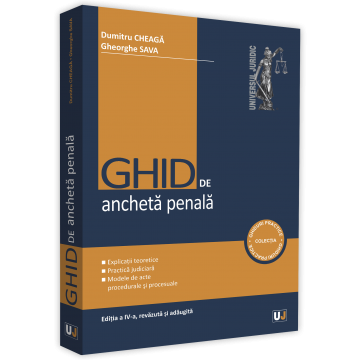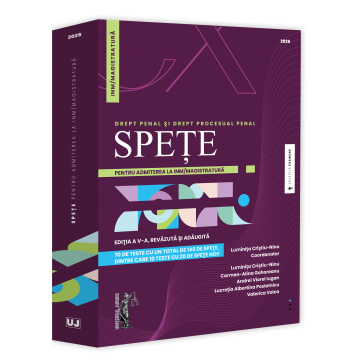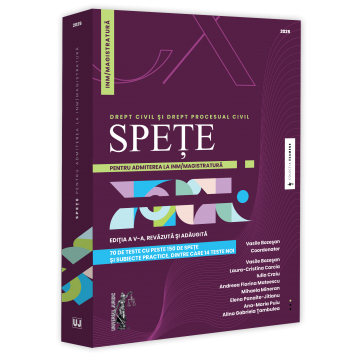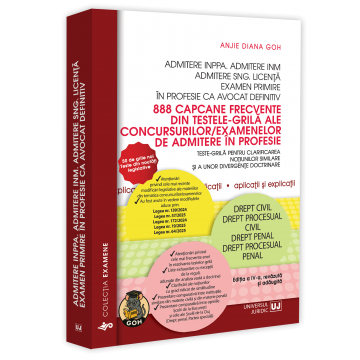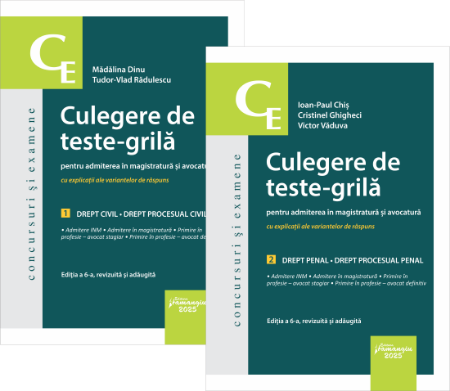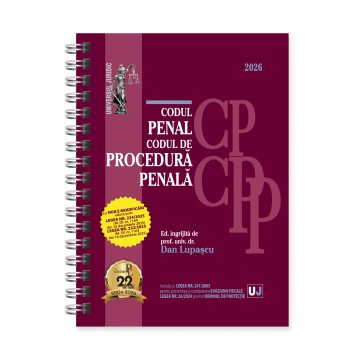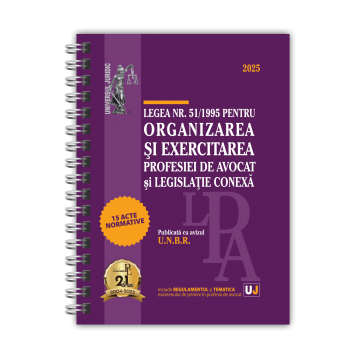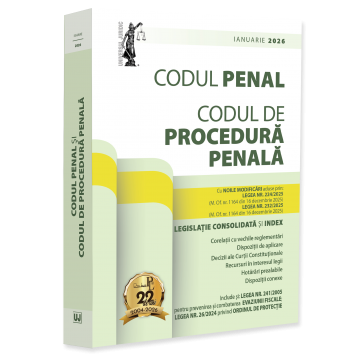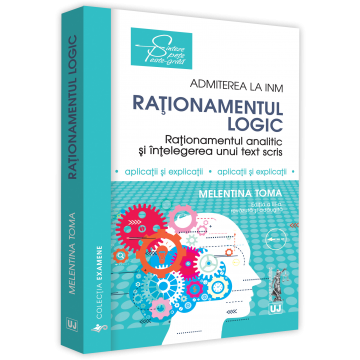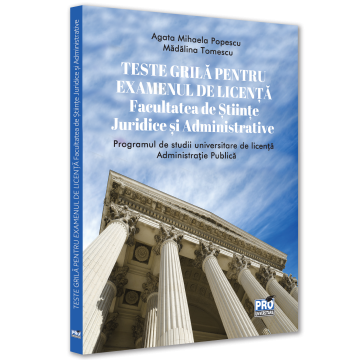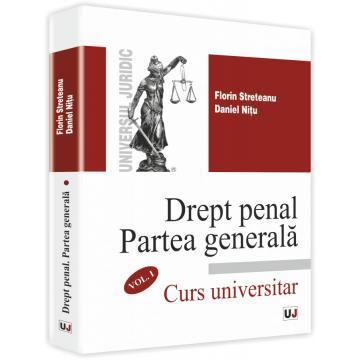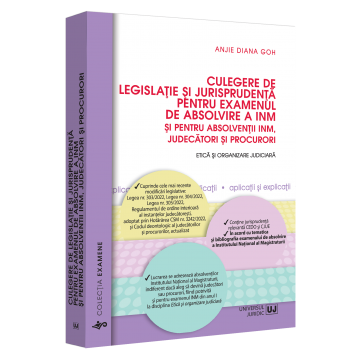Publisher: Editura Universitară
Author: Roxana-Maria Calin
ISBN: 978-606-28-0134-2
DOI: 10.5682/9786062801342
Publisher year: 2014
Edition: I
Pages: 307
- Description
- Download (1)
- Authors
- Content
- More details
- Reviews (0)
The right guaranteed by art. 8 is not an absolute one, its limitations proving to be in conformity with the Convention insofar as they are provided by an accessible and predictable national law, it aims at fulfilling a legitimate interest (defense of national security, public safety, economic well-being of the country, defense of order and prevention criminal acts, the protection of health or morals, or the protection of the rights and freedoms of others) and constitute necessary measures in a democratic society.
The Court considered with regard to the notion of family life that the institution of the family is not a fixed element either historically or sociologically. Thus, he found that he falls under the protection of art. 8 traditional family relationships, ie those between spouses from a marriage concluded according to national law, the relationship of natural parentage or adoption, affinity relationships, heterosexual cohabitation, especially when a child is born, but also de facto family relationships between people who they did not formalize the relationship.
The Court extended the protection offered by art. 8 of the Convention and on the potential family relations that may develop between a child born out of wedlock and his biological parent and in the case of Pini and others v. Romania (judgment of 22 June 2004), the Court ruled that a projected family life , desired, could, in special circumstances, fall under the protection of art. 8 of the Convention, especially when the impossibility of establishing effective family relations cannot be imputed to the applicant. The Court found, finally, that, although this could not be a fully established family life, given the lack of cohabitation and sufficiently de facto close ties between the applicants and their adopted daughters, both before and after. and after pronouncing the decisions approving the adoption, this is not attributable to the applicants, who, choosing the minors on the basis of a simple photograph, without any real contact with them in order to prepare them for adoption, did nothing but follow the procedure set out in matter of the Romanian state. In addition, as is clear from the evidence in the file, the applicants always considered themselves the parents of the minors and always behaved as such towards them, using the only way open to them, namely, by sending them letters and writings. in Romanian. The Court considered that such a relationship, based on a legal and real adoption, can be considered sufficient to benefit from the protection provided by art. 8 of the Convention. Regarding the observance of art. 8, the Court noted that the refusal to go to Italy to be with their adoptive parents, constantly expressed by minors after the age of 10, is of particular importance. Or, the conscious opposition of the children regarding the adoption makes unlikely their integration, in a harmonious way, in the new adoptive family. In the light of the above, the Court considered that the national authorities could legally and thoroughly consider that, despite the applicants' legitimate aspirations to start a family, their right to develop relations with adopted minors was limited by the interest. children. In conclusion, art. 8 of the Convention has not been violated.
Regarding the projected family life, the situation due to M.P. and others v. Romania (decision of 15 April 2014), which refers to the conception of a child. The Court noted the non-violation of art. 8 of the Convention, applicable to the factual situation insofar as it refers to the parents' desire to conceive a child who is not affected by a genetic disease, this choice being a form of expression of their private and family life. The national courts held that the applicants' rights to make an informed choice to keep or not the child had been violated, due to medical negligence on the part of the doctor. It is up to the state to assess the relevant domestic legislation and to establish accordingly the amount to be awarded as compensation, so that it is related to the damage suffered.
Regarding the protection of family life between parents and children, the Court considered that art. 8 implies the right of a parent to effective measures from the state to reunite him and his child (Ignaccolo-Zenide v. Romania, judgment of 25 January 2000). In this case, the Court started from the principle of the need to reunite the family materialized in the right of Fr. to benefit from appropriate measures from the state to be with his child. The same principle applies to the relations between a child and his grandparents, all the more so as a court decision was pronounced in favor of the latter by which their right to have contact with the child was recognized (Nistor c. Romania, decision of November 2, 2010).
In order to ensure its effectiveness, art. 8 of the Convention also includes a procedural side, specific requirements of the matter being required to be met at the national level.
Reaffirming most of the time, itself, the case file, the Court mainly analyzes the motivation of the decision of the national court, looking at whether it has focused concretely on all aspects seen by the parties. Without ignoring the importance of motivating any court decision, in the field of family relations, this procedural guarantee acquires increased significance. In the case of Amanalachioai v. Romania (judgment of 26 May 2009), the Court held that the national judgments were contradictory, which ultimately made it impossible for the applicant to maintain a family relationship with his child. The Court concluded the violation of art. 8 of the Convention on the ground that the State authorities (administrative and judicial) had not taken the necessary swift legal measures to ensure the applicant a concrete and effective possibility of obtaining the return of the six-year-old minor left to her maternal grandparents against her father's will.
In the case of A.M.M. c. Romania (decision of February 14, 2012), the violation of art. 8 of the Convention as a result of procedural deficiencies regarding the lack of effective assistance of the minor and the protection of his interests from the legal representative and the guardianship authority, which were not remedied by the courts of first instance, although it was ordered by the court superior and the non-observance by the national courts of the fair balance between the juvenile's interest in establishing his paternity and the defendant's right not to appear before the court nor to submit to the DNA test, by maintaining procedural deficiencies in the context of which they ruled.
In the case of Brée v. Romania (judgment of 3 December 2013), the Court rejected the complaint based on art. 8 of the Convention, viewed separately and in combination with art. 14 of the Convention, on non-compliance with the parent's right to have personal relations with the child, discrimination on grounds of citizenship and domicile in exercising this right, and failure to fulfill positive obligations of the authorities, analyzing factual aspects and concluding that the complaint is manifestly unfounded. Discrimination, from the perspective of art. 8 of the Convention, however, was retained in the case of Hulea v. Romania, the Court finding a violation of the right under the Convention as a result of the refusal of the national authorities to grant the applicant parental leave on grounds of male sex, even though he was an army employee.
The duration of judicial proceedings having as object the regulation of family relations must be a reasonable one in relation to the specifics of these cases. Thus, in the case of Saileanu v. Romania (judgment of 2 February 2010), the Court held that a period of 5 years for resolving a divorce application could not be considered reasonable against the stakes of the dispute, taking into account the fact that at the end of it, the national courts declared themselves incompetent to settle the case. In the case of Deak v. Romania (judgment of 3 June 2008), art. 6 of the Convention from the perspective of the unreasonable duration of the civil procedure was found to be violated due to the duration of the proceedings initiated under the Hague Convention on the Civil Aspects of International Child Abduction, which had to be carried out with special speed.
The costs of such proceedings shall be taken into account by the Court in verifying the fulfillment or non-fulfillment of the positive obligations of the State for the effective observance of family life. Thus, in the case of Iordache v.
Romania (judgment of 14 October 2008), the European Court held that although the amount set for the applicant as a court fee seemed insignificant (9 lei), it had to be taken into account his particular situation, namely his state of detention, that it depended on the financial resources that the other members of his family could offer him, as well as the particularly important stake for him of the process he started (establishing personal ties with his child).
The purely formal character of the social investigations carried out during the process involving the settlement of family relations may lead to a violation of art. 8 of the Convention, given that the European court is particularly sensitive to the concrete efforts of the authorities in dealing with this Your case in the case of M. and C. v. Romania (decision of September 27, 2011), the violation of art. 3 and 8 of the Convention in respect of the second applicant, as the State authorities have not fulfilled their positive obligations in the field of these articles and have not carried out an effective investigation capable of effectively establishing the facts and leading to sanction. all forms of sexual abuse.
In the parent-child relationship, it was noted that interfering with family life removed the minor from parental care and placed him in the care of the state, which must be conceived as temporary, the authorities will be constantly concerned with reuniting the child with his family. In the case of M.B. c. Romania (no. 2) (decision of February 19, 2013), the Romanian state was convicted pursuant to art. 8 of the Convention, considering that under the aspect of non-compliance with the procedural guarantees regarding the forced medical hospitalization and the disposition of the measure of placement of minor children belonging to a person against whom this hospitalization was ordered.
Regarding the rights due to parents after their separation in relations with minors, the Court analyzed in certain cases the observance and assistance provided by the authorities regarding the visitation program of the minor who must be able to achieve his goal, respectively maintaining the family relationship.
In the case of Dobrescu v. Romania (decision of inadmissibility of 31 August 2010), referring to the particularities of the case, the Court considered the non-violation of art. 8 of the Convention, noting that a two-hour-a-week visiting schedule represents a proportionate interference with the exercise of the applicant's right to respect for his family life. The national authorities have taken into account the very young age of the child (3 years), his regular life schedule and the consequences that changes in this program could have on him. In Nistor v. Romania (2 November 2010), the Court held that domestic decisions establishing the applicants' visiting hours eight hours a week constituted an interference with the exercise of their right to respect for family life, but that it complied with paragraph 2 of Article 8 of the Convention. The violation of art. 6 par. 1 of the Convention, as a result of the non-execution of a court decision pronounced by way of the presidential ordinance, which established a program for visiting the minor, in favor of the applicants.
In the matter of court decisions that enshrine a right of access in favor of the parent, his personal interest is complemented by the general one, to ensure the prestige of justice, security and safety of the civil circuit, principles that require a sustained active role of the authorities in order to device performance. The obligation of national authorities to take measures in order to enforce court decisions in matters of family law is not absolute or instantaneous, because sometimes the reunion of a parent with his children who have lived with the other parent for a long time cannot takes place immediately and requires preparatory measures. It was established that the obligation of the authorities to execute a pronounced decision in this matter is one of diligence and not of result. Therefore, exceptional circumstances, relative to the factual situation, may justify a non-execution in this field.
With regard to the "exceptional factual circumstances" that may lead the authorities to reject the parent's request for restitution of the minor over whom the parental rights are recognized, the Court considered that the mere opportunity for the minor to be raised in another setting, more adequate to his education and mental comfort, he cannot justify in himself, his movement and subsequently maintaining him for a long time, away from his natural parents. Where there are family ties and the refusal to return the minor is determined exclusively by the long time he spent in the care of other people and implicitly by his accommodation with the new life, the state authorities have the obligation to act to encourage resumption of relations. of the initial family and not of maintaining for a longer and longer duration the separation in fact (Amanalachioai v. Romania, judgment of 26 May 2009).
With regard to the measures taken by the authorities to enforce the right of access, the Court considered that their nature and extent depended on the circumstances of each case and on the cooperation of all persons involved.
Recourse to "justice assistants" - specialists in social work and psychology is particularly important for preparing and facilitating the resumption of family relationships traumatized by a divorce. In the case of Costreie v. Romania (judgment of 13 October 2009), the inefficient nature of the social investigation reports was retained. drawn up in the case, as they limited themselves to a factual situation, formulating general recommendations without proposing any concrete measures, and the social workers did not undertake any meeting with the minors to prepare them for the reunion with their father. It was found the violation of art. 8 of the Convention by failing to make reasonable efforts by the competent authorities to facilitate regular relations between the applicant and his two daughters ordered by court decisions and by not sanctioning the mother of minors to prevent the applicant from seeing minors and refusing to comply with judgments.
However, in the case of Carstoiu v. Romania (judgment of 7 May 2013), the Court held that there had been no violation of Art. 8 of the Convention, noting from the perspective of participation in the execution of the court decision establishing the visitation schedule, that the authorities reacted promptly and efficiently, the Child Protection Authority offering active assistance to the applicant in his attempts to reunite with his child.
Also, the Court ruled that the authorities cannot be required to enforce a decision having as object the right of visit of a minor, in the physical absence of the creditor, respectively only through the contest of the bailiff or the police (Nistor v. Romania, the decision of November 2, 2010, and Fusca v. Romania, decision of July 13, 2010). Both the behavior of the authorities and that of the interested person are aspects that must be analyzed in the hypothesis of an execution of a court decision pronounced in this field. The diligence of the creditor and his physical presence are indispensable for the implementation of the court's dispositions (Fusca v. Romania).
However, the Court considered in the cases Fusca v. Romania (judgment of 13 July 2010), Cristescu v. Romania (judgment of 1 January 2012) and Sbarnea v. Romania (judgment of 21 June 2011), that they complied with the provisions of art. 8 of the Convention the measures taken by the national authorities: the investment with the executory formula of the decision at a short interval (one week) from the introduction of the request, the issuance of the summons by the executor on the same day as the receipt of the execution request, accompanying the creditor when this was requested, the application of administrative fines to the mother in a very short time for non-compliance with the applicant's right, the involvement of social workers in the enforcement procedure. In the cases of Sbarnea and Fusca, previously mentioned, but also in the case of Pascal v. Romania (decision of April 17, 2012), it was noted the non-violation of art. 8 of the Convention, finding compliance with the positive obligation of the State to take the necessary measures in order to enforce a court decision favorable to the applicant by which he was granted the right to maintain personal ties with his child and to visit him. The fault of the plaintiff himself in the non-fulfillment by the authorities of their tasks was retained in the case of Mereuta v. Romania (decision of 10 April 2012), which led to the conclusion of non-violation of art. 8 of the Convention, together with the finding that the authorities have reasonably fulfilled their positive obligations to assist the applicant as best as possible in his efforts to exercise this right. For a contrary situation and a finding of the violation of art. 8 in that the Romanian authorities did not make adequate and sufficient efforts to ensure that the applicant's right to visit and to live with his child was respected for six years, the case of Lafargue v. Romania (judgment of 13 July) 2006), as well as the case of Monory v. Romania and Hungary (judgment of 5 April 2005), regarding the custody of the minor.
In the cases that have as object the international abduction of children, the obligations of the states are governed both by the provisions of art. 8 of the Conventions as well as those of the Hague Convention of October 26, 1960. The system of protection in this matter is based on the principle of immediate return of the minor to his country of residence, a principle against which the fulfillment of positive obligations is analyzed. . Thus, in the case of Iosub Caras v. Romania (judgment of 27 July 2006), the omission by the administrative authorities and especially the Ministry of Justice to inform the divorce courts about the existence of the process based on the Hague Convention, lacking the Hague Convention by its very purpose, that is to prevent the taking of a decision on the merits of the right related to custody in the state where the child is detained.
In the case of Ignaccolo-Zenide v. Romania (judgment of 25 January 2000), the Court ruled on the violation of art. 8 of the Convention, considering that none of the measures listed in art. 7 of the Hague Convention on the Enforcement of the Right to Visit of Minors. There were no coercive measures against the father and nor adequate measures, preparatory for the only meeting between the mother and her children in order to return them and restore the family relationship.
In the case of Karrer v. Romania (decision of February 21, 2012), it was found the violation of art. 8 in view of the fact that the applicants' interference with the private and family life was not based on a thorough analysis of the best interests of the child and the procedure provided for in the Hague Convention was not carried out expeditiously. The Romanian courts did not carry out a detailed analysis in order to assess the child's best interests in his father's request for his return to Austria and did not offer the applicant the opportunity to support his case effectively.
In the case of Raban v. Romania (judgment of 26 October 2010), the Court found that there had been no violation of Art. 8 of the Convention, under the aspect of the right to family life, leaving room for the state's discretion in determining the best interests of the child, in case of an alleged international abduction and establishing in concrete terms the applicability of the Hague Convention on Civil Aspects of International Child Abduction . The rejection of the request to return the child to the state of domicile, as long as it is duly motivated, taken following a procedure with the observance of the procedural guarantees and subsumed to the superior interest of the minor, satisfies the exigencies of art. 8. Also, the non-violation of art. 8 of the Convention, because the enforceable force of the obligation to return the children can be questioned in the case of Chernat and others v. Romania (decision of inadmissibility of July 3, 2012). The return decision from 2007 was limited in time, namely until the moment when a competent authority would have ruled on the issues related to the entrustment, respectively in 2010, when the two decisions of the courts of the Republic of Moldova were recognized, whereby the minors were entrusted to the first applicant.
The balancing of the interests of the minor and the parent in the situations of establishing paternity occasioned an analysis of the European Court in which the interest of the minor prevailed. Thus, in the case of I.L.V. c. Romania (decision of inadmissibility of August 24, 2010) was held not to violate art. 8 of the Convention because of the rejection by the national courts of the action forcing the child and the mother to undergo a DNA test, an action by which the applicant hopes to prove that he is not the father of the minor. The national courts correctly rejected the applicant's action in view of the superiority of the minor's interest, over which paternity had already been established since 1991, over the father's interest in finding out the truth. It was also found that the applicant had not lodged any appeal against the original judgment of 1991.
In the case of Ostace v. Romania (judgment of 25 February 2014), the interest of the person whose paternity was in question prevailed. The violation of art. 8 of the Convention from the perspective of a fair balance between the applicant's interest and the general interest. Declaring inadmissible his request to reopen the procedure in establishing the paternity of the child born out of wedlock, although the persons concerned seemed to agree with establishing the biological truth about the child's parentage, the national authorities did not take into account the fair balance to be struck between .
From the criminal perspective, we highlight the case of Sabou and Pircalab (decision of September 28, 2004), in which the violation of art. 8 of the Convention, since the absolute withdrawal and by the effect of the law of parental rights as an accessory punishment does not correspond to a primordial necessity regarding the interests of the child and, consequently, does not pursue a legitimate purpose, namely the protection of health, morals or education of minors.
This paper can be a necessary tool for the university environment, magistrates and lawyers, as well as a very useful source of reference for any other people who want to be properly informed on the legal space of the issues discussed in the field of family life.
-
Viata de familie. Hotarari ale Curtii Europene a Drepturilor Omului pronuntate in cauzele impotriva Romaniei
Download
Judge, Bucharest Tribunal, deputy editor-in-chief of the Forum of Judges Magazine, vice-president of the European Association of Magistrates for Human Rights, member of the editorial board of the Jurisclasor ECHR magazine.
Alphabetical table of contents / 7
Introduction / 9
1. Ignaccolo case ‑ Zenide against Romania / 20
2. The case of Pini and Bertani and Manera and Atripaldi against Romania / 27
3. The case of Sabou and Pircalab against Romania / 42
4. Monory case against Romania and Hungary / 48
5. Lafargue case against Romania / 54
6. The case of Iosub Caras against Romania / 66
7. Deak case against Romania and Great Britain / 74
8. Amanalachioai case against Romania / 78
9. Costreie's case against Romania / 93
10. Fusca case against Romania / 111
11. Case I.L.V. against Romania / 117
12. Dobrescu case against Romania / 127
13. Raban case against Romania / 139
14. Nistor case against Romania / 146
15. Sbarnea case against Romania / 157
16. Case of M. and C. against Romania / 162
17. Balasoiu case against Romania (no. 2) / 175
18. Cristescu's case against Romania / 181
19. The case of A.M.M. against Romania / 185
20. Karrer's case against Romania / 195
21. Mereuta case against Romania / 202
22. Pascal case against Romania / 208
23. Case of Chernat and others against Romania / 226
24. Hulea case against Romania / 240
25. Knecht case against Romania / 248
26. Case B. v. Romania (no. 2) / 257
27. Carstoiu's case against Romania / 265
28. Bree's case against Romania / 275
29. Ostace case against Romania / 283
30. Case M.P. and others against Romania / 291
The right to respect for family life is guaranteed, mainly, by art. 8 of the Convention. The principles emerged by jurisprudence from the interpretation of this text are completed by those derived from the application of the provisions of art. 12 of the Convention (right to marriage), art. 2 of the First Additional Protocol to the Convention (right to education) and of art. 5 of Protocol no. 7 in addition to the Convention (equality of spouses).
The right guaranteed by art. 8 is not an absolute one, its limitations proving to be in conformity with the Convention insofar as they are provided by an accessible and predictable national law, it aims at fulfilling a legitimate interest (defense of national security, public safety, economic well-being of the country, defense of order and prevention criminal acts, the protection of health or morals, or the protection of the rights and freedoms of others) and constitute necessary measures in a democratic society.
The Court considered with regard to the notion of family life that the institution of the family is not a fixed element either historically or sociologically. Thus, he found that he falls under the protection of art. 8 traditional family relationships, ie those between spouses from a marriage concluded according to national law, the relationship of natural parentage or adoption, affinity relationships, heterosexual cohabitation, especially when a child is born, but also de facto family relationships between people who they did not formalize the relationship.
The Court extended the protection offered by art. 8 of the Convention and on the potential family relations that may develop between a child born out of wedlock and his biological parent and in the case of Pini and others v. Romania (judgment of 22 June 2004), the Court ruled that a projected family life , desired, could, in special circumstances, fall under the protection of art. 8 of the Convention, especially when the impossibility of establishing effective family relations cannot be imputed to the applicant. The Court found, finally, that, although this could not be a fully established family life, given the lack of cohabitation and sufficiently de facto close ties between the applicants and their adopted daughters, both before and after. and after pronouncing the decisions approving the adoption, this is not attributable to the applicants, who, choosing the minors on the basis of a simple photograph, without any real contact with them in order to prepare them for adoption, did nothing but follow the procedure set out in matter of the Romanian state. In addition, as is clear from the evidence in the file, the applicants always considered themselves the parents of the minors and always behaved as such towards them, using the only way open to them, namely, by sending them letters and writings. in Romanian. The Court considered that such a relationship, based on a legal and real adoption, can be considered sufficient to benefit from the protection provided by art. 8 of the Convention. Regarding the observance of art. 8, the Court noted that the refusal to go to Italy to be with their adoptive parents, constantly expressed by minors after the age of 10, is of particular importance. Or, the conscious opposition of the children regarding the adoption makes unlikely their integration, in a harmonious way, in the new adoptive family. In the light of the above, the Court considered that the national authorities could legally and thoroughly consider that, despite the applicants' legitimate aspirations to start a family, their right to develop relations with adopted minors was limited by the interest. children. In conclusion, art. 8 of the Convention has not been violated.
Regarding the projected family life, the situation due to M.P. and others v. Romania (decision of 15 April 2014), which refers to the conception of a child. The Court noted the non-violation of art. 8 of the Convention, applicable to the factual situation insofar as it refers to the parents' desire to conceive a child who is not affected by a genetic disease, this choice being a form of expression of their private and family life. The national courts held that the applicants' rights to make an informed choice to keep or not the child had been violated, due to medical negligence on the part of the doctor. It is up to the state to assess the relevant domestic legislation and to establish accordingly the amount to be awarded as compensation, so that it is related to the damage suffered.
Regarding the protection of family life between parents and children, the Court considered that art. 8 implies the right of a parent to effective measures from the state to reunite him and his child (Ignaccolo-Zenide v. Romania, judgment of 25 January 2000). In this case, the Court started from the principle of the need to reunite the family materialized in the right of Fr. to benefit from appropriate measures from the state to be with his child. The same principle applies to the relations between a child and his grandparents, all the more so as a court decision was pronounced in favor of the latter by which their right to have contact with the child was recognized (Nistor c. Romania, decision of November 2, 2010).
In order to ensure its effectiveness, art. 8 of the Convention also includes a procedural side, specific requirements of the matter being required to be met at the national level.
Reaffirming most of the time, itself, the case file, the Court mainly analyzes the motivation of the decision of the national court, looking at whether it has focused concretely on all aspects seen by the parties. Without ignoring the importance of motivating any court decision, in the field of family relations, this procedural guarantee acquires increased significance. In the case of Amanalachioai v. Romania (judgment of 26 May 2009), the Court held that the national judgments were contradictory, which ultimately made it impossible for the applicant to maintain a family relationship with his child. The Court concluded the violation of art. 8 of the Convention on the ground that the State authorities (administrative and judicial) had not taken the necessary swift legal measures to ensure the applicant a concrete and effective possibility of obtaining the return of the six-year-old minor left to her maternal grandparents against her father's will.
In the case of A.M.M. c. Romania (decision of February 14, 2012), the violation of art. 8 of the Convention as a result of procedural deficiencies regarding the lack of effective assistance of the minor and the protection of his interests from the legal representative and the guardianship authority, which were not remedied by the courts of first instance, although it was ordered by the court superior and the non-observance by the national courts of the fair balance between the juvenile's interest in establishing his paternity and the defendant's right not to appear before the court nor to submit to the DNA test, by maintaining procedural deficiencies in the context of which they ruled.
In the case of Brée v. Romania (judgment of 3 December 2013), the Court rejected the complaint based on art. 8 of the Convention, viewed separately and in combination with art. 14 of the Convention, on non-compliance with the parent's right to have personal relations with the child, discrimination on grounds of citizenship and domicile in exercising this right, and failure to fulfill positive obligations of the authorities, analyzing factual aspects and concluding that the complaint is manifestly unfounded. Discrimination, from the perspective of art. 8 of the Convention, however, was retained in the case of Hulea v. Romania, the Court finding a violation of the right under the Convention as a result of the refusal of the national authorities to grant the applicant parental leave on grounds of male sex, even though he was an army employee.
The duration of judicial proceedings having as object the regulation of family relations must be a reasonable one in relation to the specifics of these cases. Thus, in the case of Saileanu v. Romania (judgment of 2 February 2010), the Court held that a period of 5 years for resolving a divorce application could not be considered reasonable against the stakes of the dispute, taking into account the fact that at the end of it, the national courts declared themselves incompetent to settle the case. In the case of Deak v. Romania (judgment of 3 June 2008), art. 6 of the Convention from the perspective of the unreasonable duration of the civil procedure was found to be violated due to the duration of the proceedings initiated under the Hague Convention on the Civil Aspects of International Child Abduction, which had to be carried out with special speed.
The costs of such proceedings shall be taken into account by the Court in verifying the fulfillment or non-fulfillment of the positive obligations of the State for the effective observance of family life. Thus, in the case of Iordache v.
Romania (judgment of 14 October 2008), the European Court held that although the amount set for the applicant as a court fee seemed insignificant (9 lei), it had to be taken into account his particular situation, namely his state of detention, that it depended on the financial resources that the other members of his family could offer him, as well as the particularly important stake for him of the process he started (establishing personal ties with his child).
The purely formal character of the social investigations carried out during the process involving the settlement of family relations may lead to a violation of art. 8 of the Convention, given that the European court is particularly sensitive to the concrete efforts of the authorities in dealing with this Your case in the case of M. and C. v. Romania (decision of September 27, 2011), the violation of art. 3 and 8 of the Convention in respect of the second applicant, as the State authorities have not fulfilled their positive obligations in the field of these articles and have not carried out an effective investigation capable of effectively establishing the facts and leading to sanction. all forms of sexual abuse.
In the parent-child relationship, it was noted that interfering with family life removed the minor from parental care and placed him in the care of the state, which must be conceived as temporary, the authorities will be constantly concerned with reuniting the child with his family. In the case of M.B. c. Romania (no. 2) (decision of February 19, 2013), the Romanian state was convicted pursuant to art. 8 of the Convention, considering that under the aspect of non-compliance with the procedural guarantees regarding the forced medical hospitalization and the disposition of the measure of placement of minor children belonging to a person against whom this hospitalization was ordered.
Regarding the rights due to parents after their separation in relations with minors, the Court analyzed in certain cases the observance and assistance provided by the authorities regarding the visitation program of the minor who must be able to achieve his goal, respectively maintaining the family relationship.
In the case of Dobrescu v. Romania (decision of inadmissibility of 31 August 2010), referring to the particularities of the case, the Court considered the non-violation of art. 8 of the Convention, noting that a two-hour-a-week visiting schedule represents a proportionate interference with the exercise of the applicant's right to respect for his family life. The national authorities have taken into account the very young age of the child (3 years), his regular life schedule and the consequences that changes in this program could have on him. In Nistor v. Romania (2 November 2010), the Court held that domestic decisions establishing the applicants' visiting hours eight hours a week constituted an interference with the exercise of their right to respect for family life, but that it complied with paragraph 2 of Article 8 of the Convention. The violation of art. 6 par. 1 of the Convention, as a result of the non-execution of a court decision pronounced by way of the presidential ordinance, which established a program for visiting the minor, in favor of the applicants.
In the matter of court decisions that enshrine a right of access in favor of the parent, his personal interest is complemented by the general one, to ensure the prestige of justice, security and safety of the civil circuit, principles that require a sustained active role of the authorities in order to device performance. The obligation of national authorities to take measures in order to enforce court decisions in matters of family law is not absolute or instantaneous, because sometimes the reunion of a parent with his children who have lived with the other parent for a long time cannot takes place immediately and requires preparatory measures. It was established that the obligation of the authorities to execute a pronounced decision in this matter is one of diligence and not of result. Therefore, exceptional circumstances, relative to the factual situation, may justify a non-execution in this field.
With regard to the "exceptional factual circumstances" that may lead the authorities to reject the parent's request for restitution of the minor over whom the parental rights are recognized, the Court considered that the mere opportunity for the minor to be raised in another setting, more adequate to his education and mental comfort, he cannot justify in himself, his movement and subsequently maintaining him for a long time, away from his natural parents. Where there are family ties and the refusal to return the minor is determined exclusively by the long time he spent in the care of other people and implicitly by his accommodation with the new life, the state authorities have the obligation to act to encourage resumption of relations. of the initial family and not of maintaining for a longer and longer duration the separation in fact (Amanalachioai v. Romania, judgment of 26 May 2009).
With regard to the measures taken by the authorities to enforce the right of access, the Court considered that their nature and extent depended on the circumstances of each case and on the cooperation of all persons involved.
Recourse to "justice assistants" - specialists in social work and psychology is particularly important for preparing and facilitating the resumption of family relationships traumatized by a divorce. In the case of Costreie v. Romania (judgment of 13 October 2009), the inefficient nature of the social investigation reports was retained. drawn up in the case, as they limited themselves to a factual situation, formulating general recommendations without proposing any concrete measures, and the social workers did not undertake any meeting with the minors to prepare them for the reunion with their father. It was found the violation of art. 8 of the Convention by failing to make reasonable efforts by the competent authorities to facilitate regular relations between the applicant and his two daughters ordered by court decisions and by not sanctioning the mother of minors to prevent the applicant from seeing minors and refusing to comply with judgments.
However, in the case of Carstoiu v. Romania (judgment of 7 May 2013), the Court held that there had been no violation of Art. 8 of the Convention, noting from the perspective of participation in the execution of the court decision establishing the visitation schedule, that the authorities reacted promptly and efficiently, the Child Protection Authority offering active assistance to the applicant in his attempts to reunite with his child.
Also, the Court ruled that the authorities cannot be required to enforce a decision having as object the right of visit of a minor, in the physical absence of the creditor, respectively only through the contest of the bailiff or the police (Nistor v. Romania, the decision of November 2, 2010, and Fusca v. Romania, decision of July 13, 2010). Both the behavior of the authorities and that of the interested person are aspects that must be analyzed in the hypothesis of an execution of a court decision pronounced in this field. The diligence of the creditor and his physical presence are indispensable for the implementation of the court's dispositions (Fusca v. Romania).
However, the Court considered in the cases Fusca v. Romania (judgment of 13 July 2010), Cristescu v. Romania (judgment of 1 January 2012) and Sbarnea v. Romania (judgment of 21 June 2011), that they complied with the provisions of art. 8 of the Convention the measures taken by the national authorities: the investment with the executory formula of the decision at a short interval (one week) from the introduction of the request, the issuance of the summons by the executor on the same day as the receipt of the execution request, accompanying the creditor when this was requested, the application of administrative fines to the mother in a very short time for non-compliance with the applicant's right, the involvement of social workers in the enforcement procedure. In the cases of Sbarnea and Fusca, previously mentioned, but also in the case of Pascal v. Romania (decision of April 17, 2012), it was noted the non-violation of art. 8 of the Convention, finding compliance with the positive obligation of the State to take the necessary measures in order to enforce a court decision favorable to the applicant by which he was granted the right to maintain personal ties with his child and to visit him. The fault of the plaintiff himself in the non-fulfillment by the authorities of their tasks was retained in the case of Mereuta v. Romania (decision of 10 April 2012), which led to the conclusion of non-violation of art. 8 of the Convention, together with the finding that the authorities have reasonably fulfilled their positive obligations to assist the applicant as best as possible in his efforts to exercise this right. For a contrary situation and a finding of the violation of art. 8 in that the Romanian authorities did not make adequate and sufficient efforts to ensure that the applicant's right to visit and to live with his child was respected for six years, the case of Lafargue v. Romania (judgment of 13 July) 2006), as well as the case of Monory v. Romania and Hungary (judgment of 5 April 2005), regarding the custody of the minor.
In the cases that have as object the international abduction of children, the obligations of the states are governed both by the provisions of art. 8 of the Conventions as well as those of the Hague Convention of October 26, 1960. The system of protection in this matter is based on the principle of immediate return of the minor to his country of residence, a principle against which the fulfillment of positive obligations is analyzed. . Thus, in the case of Iosub Caras v. Romania (judgment of 27 July 2006), the omission by the administrative authorities and especially the Ministry of Justice to inform the divorce courts about the existence of the process based on the Hague Convention, lacking the Hague Convention by its very purpose, that is to prevent the taking of a decision on the merits of the right related to custody in the state where the child is detained.
In the case of Ignaccolo-Zenide v. Romania (judgment of 25 January 2000), the Court ruled on the violation of art. 8 of the Convention, considering that none of the measures listed in art. 7 of the Hague Convention on the Enforcement of the Right to Visit of Minors. There were no coercive measures against the father and nor adequate measures, preparatory for the only meeting between the mother and her children in order to return them and restore the family relationship.
In the case of Karrer v. Romania (decision of February 21, 2012), it was found the violation of art. 8 in view of the fact that the applicants' interference with the private and family life was not based on a thorough analysis of the best interests of the child and the procedure provided for in the Hague Convention was not carried out expeditiously. The Romanian courts did not carry out a detailed analysis in order to assess the child's best interests in his father's request for his return to Austria and did not offer the applicant the opportunity to support his case effectively.
In the case of Raban v. Romania (judgment of 26 October 2010), the Court found that there had been no violation of Art. 8 of the Convention, under the aspect of the right to family life, leaving room for the state's discretion in determining the best interests of the child, in case of an alleged international abduction and establishing in concrete terms the applicability of the Hague Convention on Civil Aspects of International Child Abduction . The rejection of the request to return the child to the state of domicile, as long as it is duly motivated, taken following a procedure with the observance of the procedural guarantees and subsumed to the superior interest of the minor, satisfies the exigencies of art. 8. Also, the non-violation of art. 8 of the Convention, because the enforceable force of the obligation to return the children can be questioned in the case of Chernat and others v. Romania (decision of inadmissibility of July 3, 2012). The return decision from 2007 was limited in time, namely until the moment when a competent authority would have ruled on the issues related to the entrustment, respectively in 2010, when the two decisions of the courts of the Republic of Moldova were recognized, whereby the minors were entrusted to the first applicant.
The balancing of the interests of the minor and the parent in the situations of establishing paternity occasioned an analysis of the European Court in which the interest of the minor prevailed. Thus, in the case of I.L.V. c. Romania (decision of inadmissibility of August 24, 2010) was held not to violate art. 8 of the Convention because of the rejection by the national courts of the action forcing the child and the mother to undergo a DNA test, an action by which the applicant hopes to prove that he is not the father of the minor. The national courts correctly rejected the applicant's action in view of the superiority of the minor's interest, over which paternity had already been established since 1991, over the father's interest in finding out the truth. It was also found that the applicant had not lodged any appeal against the original judgment of 1991.
In the case of Ostace v. Romania (judgment of 25 February 2014), the interest of the person whose paternity was in question prevailed. The violation of art. 8 of the Convention from the perspective of a fair balance between the applicant's interest and the general interest. Declaring inadmissible his request to reopen the procedure in establishing the paternity of the child born out of wedlock, although the persons concerned seemed to agree with establishing the biological truth about the child's parentage, the national authorities did not take into account the fair balance to be struck between .
From the criminal perspective, we highlight the case of Sabou and Pircalab (decision of September 28, 2004), in which the violation of art. 8 of the Convention, since the absolute withdrawal and by the effect of the law of parental rights as an accessory punishment does not correspond to a primordial necessity regarding the interests of the child and, consequently, does not pursue a legitimate purpose, namely the protection of health, morals or education of minors.
This paper can be a necessary tool for the university environment, magistrates and lawyers, as well as a very useful source of reference for any other people who want to be properly informed on the legal space of the issues discussed in the field of family life.

6359.png)
![Family life. Judgments of the European Court of Human Rights ruled in cases against Romania [1] Family life. Judgments of the European Court of Human Rights ruled in cases against Romania [1]](https://gomagcdn.ro/domains/editurauniversitara.ro/files/product/large/viata-de-familie-hotarari-ale-curtii-europene-a-drepturilor-omului-pronuntate-in-cauzele-impotriva-romaniei-860-726638.jpg)
